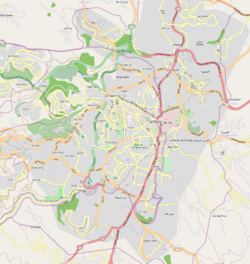Ælia Capitolina
| Location | Jerusalem |
|---|---|
| Region | Jerusalem Corpus Separatum |
| Coordinates | 31°46′32″N 35°13′52″E / 31.775689°N 35.23104°E |
| 130 CE – 324-325 CE | |

Jerusalem in the Roman empire under Hadrian showing the location of the Roman legions
|
|
| Preceded by | Jerusalem during the Early Roman period |
|---|---|
| Followed by | Jerusalem during the Byzantine period |
Aelia Capitolina (/ˈiːliə ˌkæpᵻtəˈlaɪnə/; Latin in full: COLONIA AELIA CAPITOLINA) was a Roman colony, built under the emperor Hadrian on the site of Jerusalem, which was in ruins since the siege of 70 AD, leading in part to the Bar Kokhba revolt of 132–136 AD. Aelia Capitolina remained the official name of Jerusalem until 638 AD when the Arabs conquered the city and kept the first part of it as 'إلياء' (Iliyā').
Aelia came from Hadrian's nomen gentile, Aelius, while Capitolina meant that the new city was dedicated to Jupiter Capitolinus, to whom a temple was built on the site of the former Jewish temple, the Temple Mount. (The Latin name Aelia is the source of the much later Arabic term Iliyā' (إلياء), a 7th-century Islamic name for Jerusalem.)
Jerusalem, once heavily rebuilt by Herod, was still in ruins following the decisive siege of the First Jewish–Roman War in 70 AD. Josephus – a contemporary historian and apologist for Judaism who was born in Jerusalem and fought the Romans in that war – reports that "Jerusalem ... was so thoroughly razed to the ground by those that demolished it to its foundations, that nothing was left that could ever persuade visitors that it had once been a place of habitation."
...
Wikipedia

